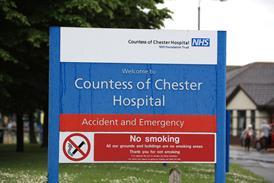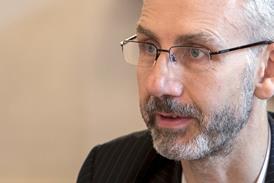What is going on in England’s biggest health economy, by Ben Clover
Elective fever
What a difference four years makes.
I wrote a profile of Barts Health Trust for HSJ’s intelligence service last month.
People (me) often throw around the word “behemoth” or “giant” in reference to the £1.3bn turnover acute and community trust, but this can obscure the interesting work it does with IT and primary care to take some of the heat off of outpatients.
In the profile I also noted the proposal to centralise a lot of Barts’ elective work at Newham from its three other major sites.
In response, a reader got in touch to point out that this idea was not a new one and had been proposed in the original merger documents.
These are merger documents that are not widely considered to have resulted in a successful merger – so that the Newham elective centre hasn’t yet materialised isn’t a big surprise.
But another reader pointed out, the size of the east London trust means it is now effectively a hospital chain – a hospital chain with four individual hospital directors (something the original design eschewed).
(If you’re a reader who wants to point something out do give me a shout at ben.clover@emap.com– I’m not quoting people by name here.)
The Barts of the near future might find itself with all the advantages of scale that a hospital chain has with none of the potentially awkward governance issues.
Issues that might have made it more difficult to turn the Newham site into an East London Orthopaedic Centre had the merger not taken place.
East London is not the only place looking to establish dedicated centres for elective care.
Getting It Right First Time leader Professor Tim Briggs will soon be going back into trusts, exposing sub-scale specialties other than the orthopaedics he’s already looked at.
Plus Jim Mackey’s recent letter to the sector urges trusts to axe services held together solely by expensive locums (will these warrant a statutory consultation?).
But south west London already has an elective orthopaedic centre with good outcomes and south east London has quite bold plans to centralise electives down from eight sites to two. Although outpatients, daycase and trauma would stay where it was, everything else elective could centralise.
Who will get what – of Guy’s, St Thomas’, Lewisham, Queen Elizabeth, Queen Mary, Dartford, King’s College and Orpington – remains to be seen.
Awkward governance issues at a hospital chain?
Talking of awkward governance issues, the Royal Free seems to be moving towards the whip end of the Foster Scale.
The Foster Scale is named after Wrightington, Wigan and Leigh Foundation Trust boss Andrew Foster who gave a talk at an HSJ event pondering whether the hospital chains were going to look more like membership organisations or chain gangs, whether partners would join voluntarily or be compelled.
Three months ago, everyone was keen to stress how membership organisation-y the arrangements would be between the Royal Free and the West Hertfordshire and North Middlesex trusts, both of which have problems.
Spokespeople and chairs were being mindful of their unhappy consultants when they said that the appointment of a director from Royal Free to the chief executive role at West Herts didn’t mean they were going to get outright acquired (although this is what happened to Barnet and Chase Farm a few years back, after a crisis prompted by accident and emergency).
Now, in governance arrangements that no one has yet explained, North Middlesex will have an interim chief executive in the form of… a director from the Royal Free.
Not only that but Royal Free chief David Sloman will be “interim accountable officer” of North Middlesex.
What this means for current chief executive Julie Lowe is not clear. The trust has said she is on leave, but it’s hardly standard practice to go on leave and find your job has been given to someone else (or two other people if you count the accountable officer role going to Mr Sloman).
What powers do the rest of the NMUH board have regarding their new chief executive and accountable officer? Again, it is not clear. NHS Improvement has now said both interim appointments were made by NMUH’s board with the approval of the regulator.
I know these are interesting times nationally, and that NHS governance has always been a bit weird, but accountability is important.
Also, is this not all a bit unfair on Ms Lowe? Yes, there have been problems in A&E (it is the worst performing in England) but as the Care Quality Commission pointed out it has “turned a corner” and performance has improved since March.
London Eye features a look at what’s going on in England’s biggest health economy. London has the best and worst regarded hospital trusts in the country. It has excellence and dysfunction in commissioning and primary care. I will cover all of this.
Please get in touch to tip me off about stories you think I should cover: ben.clover@emap.com.
Topics
- BARNET AND CHASE FARM HOSPITALS NHS TRUST
- BARTS HEALTH TRUST
- Care Quality Commission (CQC)
- Commissioning
- DARTFORD AND GRAVESHAM NHS TRUST
- East of England
- GUY'S AND ST THOMAS' NHS FOUNDATION TRUST
- Jim Mackey
- KING'S COLLEGE HOSPITAL NHS FT
- LEWISHAM AND GREENWICH NHS TRUST
- NHS Improvement
- NORTH MIDDLESEX UNIVERSITY HOSPITAL NHS TRUST
- Primary care
- QUEEN MARY'S SIDCUP NHS TRUST
- Royal Free London NHS Foundation Trust
- South
- THE QUEEN ELIZABETH HOSPITAL KING'S LYNN NHS FOUNDATION TRUST
- West Hertfordshire Teaching Hospitals Trust
- WRIGHTINGTON, WIGAN AND LEIGH NHS TRUST


























No comments yet